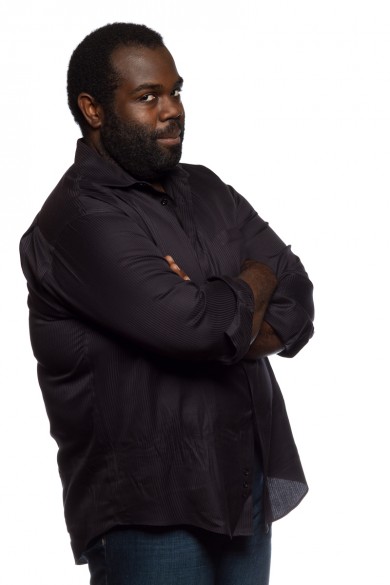Seraphic Fire’s countertenor hits a high note with deep artistry

Reginald Mobley performed a program of countertenor arias with the Firebird Chamber Orchestra Wednesday night in Miami.
Seraphic Fire’s latest concert features countertenor Reginald Mobley in an hour-long evening of captivating, lesser-known but no less deserving works from the Baroque era. Conductor Patrick Dupré Quigley’s led Mobley and the Firebird Chamber Orchestra through a creatively curated program featuring arias written for the Baroque castrato Farinelli, and yes, it is what it sounds like.
Hearing a countertenor for the first time is astonishing. Farinelli’s virtuosity, power, and flexibility in an uncanny woman’s range made him a superstar in his time. Mobley provides a perfect introduction to the genre, a genuine countertenor with a voice like maple syrup: smooth, pure, sweet, and not too heavy.
The music was impressively enhanced by the acoustic in St. Sophia Greek Orthodox Cathedral, Seraphic Fire’s superior new Miami venue. The gilded, colorful Byzantine basilica, although less intimate than St. Jude Melkite Catholic Church, has a super-charged sound.
This was evident from the opening instrumental Overture from Vivaldi’s Arsilda, regina di Ponto, which leapt off the stage. The Firebird’s youthful, propulsive playing was authentic Vivaldi, graced by concertmaster Adda Kridler’s improvisatory solo passages. Even Olukola Owolabi’s tangy harpsichord continuo was clearly audible, for a truly Baroque sound.
Stylish in an orchid shirt and lapel-less jacket, Mobley was jokingly introduced by Quigley as “not a castrato himself.” His voice truly intrigued, beginning with Handel’s “Fammi Combattere” from Orlando. Although in a female range, Mobley’s voice is definitely male, with a masculine tenor, lower register, and powerful upper notes. Mobley’s musical taste matches his exceptional instrument, with clear diction and a sure sense of line whether whisper soft or commandingly loud.
Da capo arias, common in Baroque operas, are an easy-to-follow form in three parts where the beginning of the work returns at the end. In Vivaldi’s “Vedrò con mio diletto” from Giustino, Mobley’s a cappella entrance wafted over the space, a quiet entrance growing into a strongly dramatic sound conveying the sad longing of the text.
The best performances benefitted from similar treatment, as Mobley slowly shaped each long note with supreme control. In Handel’s “Cara sposa” from Rinaldo, an eloquent lament for a missing spouse, Mobley’s countenance conveyed great sadness, alternating between plaintive and dramatically expressive, passionate and resigned.
In contrast, Mobley’s beatific demeanor conveyed reverential devotion in Nicola Antonio Porpora’s Salve Regina. Porpora was Farinelli’s voice teacher, and his music is full of coloristic effects for countertenor, with an extremely wide range, sighs, trills, large leaps, and abundant fast passages. Mobley’s interpretation of this showpiece is justification enough to attend this concert.
Firebird’s instrumental turn Burlesque de Don Quixote by Georg Philip Telemann charmingly captured the guileless Don. From the pastoral lines of “Don Quixote awakens” to vigorously ferocious repeated notes in “His attack on the Windmills,” Quigley’s liberal tempi and the ensemble’s committed performance clearly told the tale.
Mobley’s a cappella encore, a softly intoned rendition of There is a Balm in Gilead, combined Baroque pure tones and simple ornamentation with gospel portamento for a riveting finale. Patrick Quigley should make this his next recording project.
The program will be repeated 7:30 p.m. Thursday at St. Gregory’s Episcopal Church in Boca Raton; 7:30 Friday at First United Methodist Church in Coral Gables; 8 p.m. Saturday at All Saints Episcopal Church, Fort Lauderdale; and 4 p.m. Sunday at All Souls Episcopal Church in Miami Beach. seraphicfire.org; 305-285-9060.
Posted in Performances
One Response to “Seraphic Fire’s countertenor hits a high note with deep artistry”
Leave a Comment
Thu Mar 13, 2014
at 12:29 pm
1 Comment






Posted Mar 14, 2014 at 9:39 am by L Woods
Having had the privilege of singing with Mobley for several years in Tallahassee, I am not surprised to hear of his success and am thrilled to see his vocal subtlety and strength lauded in an appropriately reverent review.
If you love music, especially of the Baroque era, with its deep affects and titillating ornaments, you MUST hear this amazing artist!